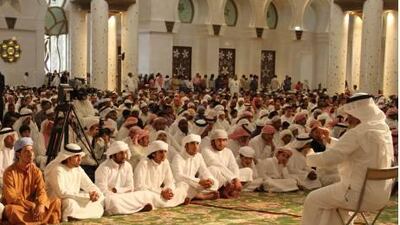With residents across the UAE attending mosques to listen to Islamic sermons each week, their contribution to tolerance in the country is vital.
Friday sermons and mainly the UAE leadership are the main contributing factors behind the tolerance of citizens and residents said Dherar Belhoul Al Falasi, Emirati writer, political analyst and Director General of the Watani Al Emarat Foundation, a social development programme that promotes the national identity and practices of good citizenship.
“It started with the leadership and their governance – Friday sermons and prayers are an embodiment of tolerance. During Friday prayers, everyone regardless of status, colour and nationality sits side by side to listen to the sermon and pray,” he said.
The sermons are translated into many languages and are listened or read by hundreds of thousands of people. Their contribution to promoting tolerance has always been significant; however, after the unification of the Friday prayers, said Dr Amal Balhoul, community affairs advisor at Watani Al Emarat Foundation, the message of tolerance that the UAE works hard to spread has grown even stronger.
Prior to unification of the Friday sermon, “many extremists and haters with personal agendas used the sermon to spread hate messages,” Dr Balhoul said. The Muslim Brotherhood hijacked the pulpit and, unfortunately, this still happens in many mosques in Europe where they continue to spread hatred.
The UAE put a stop to this by making the Friday sermon universal across the country’s mosques.
“The UAE, a country where [over 100] nationalities and people of different religions coexist, is a role model and a symbol of tolerance,” he said.
Dr Balhoul said: “We display tolerance when we communicate with people and these are the essential foundations of the National Tolerance Programme, Islam, the UAE Constitution and the legacy of the late Sheikh Zayed.”
In 2015, President Sheikh Khalifa Bin Zayed, issued the Anti-Hate Law, which prohibited contempt of other people’s religions, hate speech and discrimination because of religion or beliefs.
The international centre to confront extremism, Hedayah, was also launched.
In 2016, Sheikh Mohammed bin Rashid, Vice President and Ruler of Dubai, announced an unprecedented restructuring of the Federal Government, issuing legislation and laws that criminalise terrorism, extremism and incitement to hatred. This included an Anti-Discrimination Law, which also criminalised all acts related to contempt of religions or holy sites and all forms of hate speech.
____________
Read more:
UAE Friday Sermon: remembering the sacrifices made by Emirati soldiers
UAE Friday sermon: how to be guided on a righteous path
UAE Friday sermon: the rewards that await devout Muslims
____________
Sheikh Mohammed said: “We have learned from events in our region over the past five years … [that] we need to study, teach and practice tolerance – and to instill it in our children, both through education and our own example… We have learned from hundreds of thousands of dead and millions of refugees in our region that sectarian, ideological, cultural and religious bigotry only fuel the fires of rage.”
In a bid to further spread the values of tolerance, the Watani Emarat Foundation launched the Tolerance Caravan campaign of lectures and workshops in 2017.
“We will continue to spread the message of tolerance and now we can measure our progress every year,” Mr Al Falasi said.

